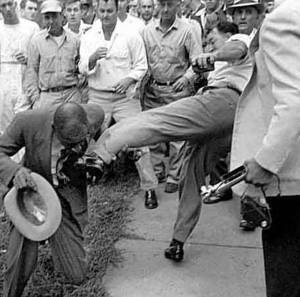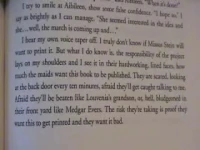If published reports are true, The Help author Kathryn Stockett had to school clueless editors in her own publishing house on the workings of Jim Crow laws.
In an excerpt from a recent interview, Stockett’s good friend Tate Taylor revealed to about.com:
Tate Taylor: “We have a great relationship, Kathryn and I. It could have gone poorly, but when I outlined the movie from the book, we met in New York and I said, ‘This is what I’m going to do.’ There was only one thing she didn’t agree with and she was right.”
Can you say what it was?
Tate Taylor: “I didn’t think we should talk about the Jim Crow Laws because I felt like people know what that is and she told me when she wrote the novel, her editors in New York – highly educated people – had no clue about Jim Crow Laws. I go, ‘Are you kidding me?’ I know, I swear! You think people know. They don’t. So she goes, ‘I’m telling you put it in,’ and I did. I thought, being a Southerner, it was too much. ‘Oh really? Of course there’s Jim Crow Laws.’ That was the one thing.”
http://movies.about.com/od/thehelp/a/tate-taylor-interview.htm
If these same “highly educated people” had no idea what blacks went through during segregation (leading me to suspect the publishing company isn’t diverse, which is another separate, troubling issue), then this quote possibly explains how Stockett’s error on Medgar Evers made it into the novel, as well as additional mis-steps regarding the perception of African Americans today, and back when bigotry reigned.
Here’s the erroneous passage that made it into the book:
They are scared, looking at the back door every ten minutes, afraid they’ll get caught talking to me. Afraid they’ll be beaten like Louvenia’s grandson, or, hell, bludgeoned in their front yard like Medgar Evers. ——Skeeter Pg 277
Stockett then went on to give three audio interviews repeating almost the exact same line, at one point embellishing that Evers’ was bludgeoned in front of his children.
Link: https://acriticalreviewofthehelp.wordpress.com/2011/04/09/medgar-evers-error-in-the-help/
While these audio pieces are the only known examples of mistaken research, there could be more floating around the internet and in print. Hopefully it was probably pointed out to the author and she now knows Evers was shot, as written about in her novel.
Why Kathryn Stockett would allege Evers died one way, while writing a compelling scene with several pages detailing that he’d been shot is a mystery. It’s possible the author was asked to add the information and she truly had no idea how Medgar Evers, one of the best known icons of the civil rights movement and a native son of Mississippi was murdered.
The book is still being sold with Skeeter’s line on Pg 277. For now the publisher and author have been silent.
I maintain that if the book had inserted a line about President John F. Kennedy being “bludgeoned” a joint statement (by the publisher and author) would have been issued with all deliberate speed and a correction would have been promised in all future copies. This underscores how The Help rode a goodwill PR wave of racial “sisterhood” because it touched on segregation, civil rights, as well as delving into the story of countless unsung domestics, primarily black maids who were the backbone of many southern families. But just like during segregation, blunders were made and quietly swept under the carpet, as with so many issues concerning race in the U. S.
While we have made progress, the popularity of a novel with stereotypes and mis-information on a culture that has been maligned, mocked and misunderstood for far too many years shows we still have a long way to go.
The Medgar Evers error is but one example of the problems with The Help.
Yet even through the bumbling and bamboozling, the book was a hit in spite of itself, finally spinning off into a film that’s expected to make millions.
Additional information on Jim Crow can be found here:
http://www.jimcrowhistory.org/history/history.htm
So if you see the movie only to leave feeling disappointed at how the film skirted over the seriousness of the segregated times, or as one reviewer of the film stated:
“The only negatives I can say about it are the sometimes caricature-y natures of the black characters and an audience who doesn’t realize that some parts they find really funny aren’t that funny (like that character’s dialect). It was a little uncomfortable listening to the audience laughing . . .”
While another admitted:
“The trouble with tackling serious issues in mainstream entertainment like this is that the issues are rarely as weighty as they need to be, and this is THE HELP’s biggest flaw.”
The repercussions of the maid’s confessional isn’t given an adequate tension, as the most vicious actions taken against the African American characters happen either off-screen or come solely from Hilly. Speaking of, Hilly is too broadly-drawn character, overly villainous and portrayed with little depth. . .”
For the full text of early screening reviews shown here, as well as others go to this post:
One of the film’s producers, Chris Columbus, may shed some light on why this happened (items in bold are my doing):
“We don’t want it to be American history; you don’t want it to be a PBS special. But I think the characters themselves are so intriguing and so exciting that the history is really just part of the story. We’re treating it with kid gloves in a sense. We want the audience to be aware of what was going on at the time because it creates a tension and danger to what these women are doing. But at the same time you don’t want to do too much, because you don’t want to take away from these characters.”
Columbus was the same producer I quoted in a post regarding the tone of the U.S. trailers (there’s too much silliness, making the movie look uneven when dramatic scenes are added). The Help appears to be a Dramedy, and Columbus confirms this by saying “It’s a very funny film as well. Kathryn has a great sense of humor.”
See, this is my problem with the attitudes of those behind the film, as well as Stockett’s in writing the novel. The author has been quoted saying she thought the book needed humor, which I believe shows her detachment on just how bad segregation was for African Americans. And there’s no mention of any African American input as in a professor or sociologist to give these guys a clue.
**Update** One of the producers of the movie, Mr. Michael Barnathan has acknowledged that advisors assisted in the production of the film. I asked a question on the twitter #100voicesrespondtothehelp thread, on 7/16. I asked whether scholarly advisors, black historians or educators were consulted regarding the skin color of the maids (all default into dark brown, when maids came in a variety of colors). He assured those participating that they did have advisors. So I’ve edited my next line, because they were being aprised of issues they could encounter. **Update**
They just don’t get it. Would the notion of “fun” be inserted in a film on the Holocaust?
And the blunders just keep on coming with this film. Here’s the latest one, a tweet from one of the executive producers which has since been deleted with an apology (but not before a screenshot was made)
Yes, this shameful time period in American history must be played for laughs, simply because a group of people got together and realized they could make some money off it. And because they don’t want to feel uncomfortable, a revistionist, white washing of the period under the guise of Stockett showing how “funny” her now deceased maid Demetrie was rules the day. And from the tweet above, looks like a number of them think it’s all a big joke.
Sort of like this:

Aibileen and Minny having a ball in the kitchen, as the whitewashing of segregation via films returns
Which is simply a return to this:

Show boat 1929 grinning and singing in the kitchen scene
For a better part of a century African Americans were stuck in the kitchen of countless Hollywood films.
The Help has done nothing but simply return us there, as many readers as well as moviegoers are lulled into thinking this is something exciting and new. It’s not. It’s a role we were relegated to, escaped from, and now that some are feeling nostalgic for southern “traditions”
IT’S BACKKKKK!!!
While Old Hollywood was intent on pumping out scenes of “happy domestics in the kitchen” for most African Americans, the laughter stopped here. Because segregation lasted over a century:

Alex Wilson's attack continues

The kick seen 'round the world. Alex Wilson is attacked by mob and the world finally sees what African Americans subjected to.
No, you won’t find the above truths in The Help movie. It’s all about protecting southernisms like the precise color of vegetables according to the quote below by director and screenwriter Tate Taylor. Those are the things they had to get just right to assure the film’s “authenticity” (items in bold are my doing).
“What’s unusual is that almost all the food in the movie was made by real Southern cooks—including teachers, a journalist and a cafeteria manager—recruited in Greenwood, Mississippi. Hollywood filmmakers typically work with caterers and food stylists, but Taylor, a Jackson native, wanted authenticity. “There’s a way we cook in the South; vegetables get a certain color to them,” he says. “That gets lost a lot of times, unless the right people make the food.”
Link: https://acriticalreviewofthehelp.wordpress.com/2011/07/14/new-jim-crow-the-help/
Chris Columbus also reveals there was talk of a cook book (collective groan of WTF? goes round as I tell this to my family). Yes, in an effort to squeeze even more money out of all this, some braniac at the studio thought of another way to remind African Americans just why we were tolerated at all during segregation, which was our ability to cook and serve (that and cheap labor. And for females, forced sex).
I’m pretty sure Minny’s recipe’s were considered. Just think, Octavia Spencer could have adorned the cover of a cookbook, holding up a platter of southern cuisine and spouting this line from the book:
“Can’t have no proper sandwich on no raw bread. And this afternoon I’ll make one a Minny’s famous caramel cakes. And next week we gone do you a fried catfish. . .” (Minny, Pg 140)
Or perhaps this one:
“Let’s see, I put the green beans in first, then I go on and get the pork chops going cause , mmm-mmm, I like my chops hot out the pan, you know.” (Minny Jackson, Pg 166 of The Help)
However I doubt if that will be in the works after this unflattering quote by Columbus:
“There was a time when the studio was talking about a cookbook, but the food is horrendous!”
At first I thought it was a mis-quote, but then a similar statement turned up in another interview:
“There were times when the studio was talking about a cookbook, but I don’t know if anyone wants to cook these things. Southern food is much better, but when they’re not eating these fancy, baby showers and things, the food they served is horrendous but it’s real . . .”
Link: http://movies.about.com/od/thehelp/a/chris-columbus-interview.htm
Looks like the cookbook idea may still be on. Executives behind the movie have announced a deal with HSN. In turn HSN has Carol’s Daughter, Emeril and Lela Rose creating products “inspired” by the film.
the spirit of “The Help,” the must-see new movie from
DreamWorks Pictures. Experience beauty, home decor,
designer fashions and more from top brands such as
Carol’s Daughter, Emeril and Lela Rose for HSN —
all in the essence of this inspiring story.
online August 1 | on air August 5-6
For more on this very bad idea, see this post:













Posted on July 16, 2011
0